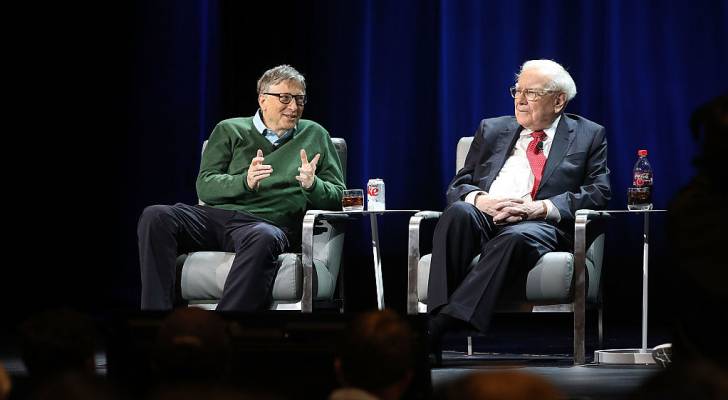
In 2010, Bill Gates, Melinda French Gates, and Warren Buffett launched a bold initiative: they promised to donate the majority of their wealth to philanthropy. They invited other billionaires to do the same.
The effort, known as The Giving Pledge, quickly attracted 40 of America’s wealthiest individuals and families, including names like Michael Bloomberg and David Rockefeller. Within two months, it seemed to signal a new golden age of giving.
But 15 years later, CNBC reports that the momentum has faded. So what happened?
Must Read
- Thanks to Jeff Bezos, you can now become a landlord for as little as $100 — and no, you don’t have to deal with tenants or fix freezers. Here’s how
- I’m 49 years old and have nothing saved for retirement — what should I do? Don’t panic. Here are 6 of the easiest ways you can catch up (and fast)
- Dave Ramsey warns nearly 50% of Americans are making 1 big Social Security mistake — here’s what it is and 3 simple steps to fix it ASAP
The rise and stall of The Giving Pledge
At its peak in 2010, The Giving Pledge had 57 signatories, representing 14% of America’s billionaires at the time.
Today, it has 256 signatories globally — including 110 from the U.S. — but that now accounts for just 12% of the U.S. billionaire population, according to the Institute for Policy Studies (IPS).
Enrollment has slowed significantly. Only four new members joined in 2024. Although the number ticked slightly upward in 2025 with 11 new pledgers, it remains far from the initiative’s early momentum.
Meanwhile, billionaire wealth has ballooned. According to Oxfam International, billionaires gained $2 trillion in 2024 alone, bringing their total combined wealth to $15 trillion.
So why are fewer of the world’s wealthiest getting on board?
According to Chuck Collins of the IPS, some billionaires may be overwhelmed by how fast their wealth has accumulated.
“Some of this is fairly sudden, the wealth growth,” Collins told CNBC. “So you got to give people… a decade of slack, if you just land in the billionaire class to figure it out.”
Still, the IPS report criticized The Giving Pledge as “unfulfilled” and “unfulfillable,” with only one living couple — John and Laura Arnold — confirmed to have fulfilled their pledge.
A Giving Pledge spokesperson pushed back, calling the report “misleading” because it ignored donations through private foundations and other channels. They argue the pledge has helped “create new norms of generosity” and foster a global philanthropic community.
Read more: This is how much US drivers saved on car insurance when they switched providers, according to a new Consumer Reports survey of 140,000 policyholders
A shift in giving or a shift in values?
Younger billionaires aren’t necessarily hoarding wealth — but many are embracing different approaches to giving.
Amir Pasic, dean of Indiana University’s Lilly Family School of Philanthropy, notes that initiatives like Blue Meridian Partners represent a shift toward collective, results-oriented philanthropy.
Others are exploring impact investing or funding tech research. Oracle co-founder Larry Ellison, for instance, launched the Ellison Institute of Technology in 2024 to tackle global challenges — a move consistent with his broader philanthropic interests.
In 2023, venture capitalist Marc Andreessen famously argued that creating world-changing technology is philanthropy in itself — even if the creator pockets billions.
“I think there’s a little more blurring between for profit and nonprofit, charity versus impact investing,” Collins told CNBC.
This evolution reflects broader shifts in how wealth — especially tech-driven wealth — is perceived. Where Buffett and Gates once stood as models of philanthropic responsibility, newer billionaires often see market innovation as their most significant contribution.
While most people will never face the challenge of giving away billions, The Giving Pledge raises important questions about values, legacy, and social responsibility. Whether through time, money, or skills, the lesson remains: giving is about impact.
What to read next
- How much cash do you plan to keep on hand after you retire? Here are 3 of the biggest reasons you’ll need a substantial stash of savings in retirement
- There’s still a 35% chance of a recession hitting the American economy this year — protect your retirement savings with these 5 essential money moves ASAP
- This tiny hot Costco item has skyrocketed 74% in price in under 2 years — but now the retail giant is restricting purchase. Here’s how to buy the coveted asset in bulk
- Want an extra $1,300,000 when you retire? Dave Ramsey says this 7-step plan ‘works every single time’ to kill debt, get rich in America — and that ‘anyone’ can do it
Join 200,000+ readers and get Moneywise’s best stories and exclusive interviews first — clear insights curated and delivered weekly. Subscribe now.
This article provides information only and should not be construed as advice. It is provided without warranty of any kind.